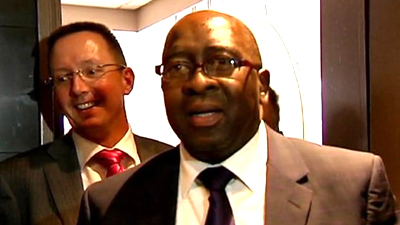Finance Minister Nhlanhla Nene will have his work cut out at next week’s budget to try and reassure disillusioned South Africans that the government still has gas in its tank to pull the economy out of the doldrums.
Twenty years after Nelson Mandela swept the African National Congress to power, pledging to unleash the economy and ensure universal access to quality education, jobs and houses, very little of the optimism that engulfed the country then remains.
For South Africans like Mulalo Ramavu, a self-employed handyman who barely scratches out a living for his family of four in Johannesburg’s poverty-stricken Alexandra township, confidence that the ANC can reduce social inequality and significantly improve living standards for blacks has long gone. The future looks even bleaker for his young sons.
“This is not the South Africa I expected after apartheid,” said 40-year-old Ramavu, reflecting on his long-abandoned dreams of becoming an engineer and buying a house in the suburbs, the preserve of whites during apartheid rule.
“After a promising start, the ANC now seems to be taking us backwards, and I fear for the future. I don’t see how Nene can convince me otherwise.”
Even the ruling party’s harshest critics concede it has done a lot to better the lives of black South Africans since 1994, building over 3 million houses, improving access to water and power and providing social grants to over 15 million people.
But many are growing impatient with the government’s failure to get the economy moving after a 2009 recession.
After averaging 5 % previously, annual economic growth has struggled to reach 2 % in the last five years.
In February, then Finance Minister Pravin Gordhan predicted growth of 2.7 % for 2014, but Nene has admitted that now looks unattainable after months of debilitating strikes that have hit efforts to reduce 25 % unemployment.
Official data shows nearly 3 million 18 to 24-year-olds cannot find jobs, translating to a youth unemployment rate of above 60 %.
“Unemployment has turned our youth to crime and lawless behaviour. The desperation is simmering towards boiling point,” said Mkhuleko Hlengwa, chairman of the youth wing of the opposition Inkatha Freedom Party.
“The desperation of our people may translate into a catastrophe which will reverse the gains of the past 20 years,” he told a conference this week, noting young people have been at the forefront of protests against poor services.
President Jacob Zuma in May promised “radical socio-economic transformation” through industrialisation, black empowerment and expanding the state’s role in the economy, but few believe his plan will be realised.
Apartheid was wrong, but so, in some ways, is BEE.
Confidence in Zuma’s leadership, moreover, is at an all-time low after the public protector found the government had inappropriately used more than 240 million rand in state funds to upgrade the president’s country home.
Economists urge the government to overhaul restrictive labour regulations to attract more investment, slash the bloated civil service and clamp down on corruption by government officials to free up funds for productive sectors of the economy. But they expect little progress on this from Nene in his budget.
South Africa, which recently lost its status as Africa’s biggest economy to Nigeria, is still suffering from protracted wage strikes in the platinum mining and manufacturing sectors earlier this year, meaning Nene has limited funds at his disposal for the quarter of the population that rely on social grants.
Already, the government is sitting on a debt-to-GDP ratio of 40 %, the result of years of spending to boost growth and finance what critics say is an unwieldy public sector wage bill.
“What we should be doing is shrinking government. We should be finding ways to do more with less, not less with more,” said George Glynos, managing director at ETM Analytics.
“The government has done a very poor job of boosting confidence in the longer-term prospects of the economy.”
Business confidence is close to record lows, with firms worried about rigid labour laws they say have given unions free rein to stage crippling strikes to press for above-inflation wage demands.
The ANC has, over the years, flirted with policies which, on paper, promise to boost growth and lift the black majority out of poverty.
Foremost has been a Black Economic Empowerment (BEE) employment code that critics say has only benefited ruling party cronies.
Many studies suggest the critics might be right, with several measures of overall inequality widening from 1994 levels, albeit with a small black minority joining the ranks of the super wealthy.
A recent report coordinated by Oxfam and funded by the European Union noted that South Africa’s Gini coefficient — a widely used equality indicator — rose to 70 % in 2008, one of the highest levels in the world, from 66 % in 1993.
Few people dispute the need to redress the imbalances left by apartheid but white South Africans, such as retired school teacher Anne Sharpe, believe BEE is unfairly edging their children out of the labour market, forcing many to emigrate.
“Many young whites see no future for themselves here and feel persecuted for a history they were not part of,” said Sharpe, 69.
“Apartheid was wrong, but so, in some ways, is BEE. Two wrongs don’t make a right.”
– By


